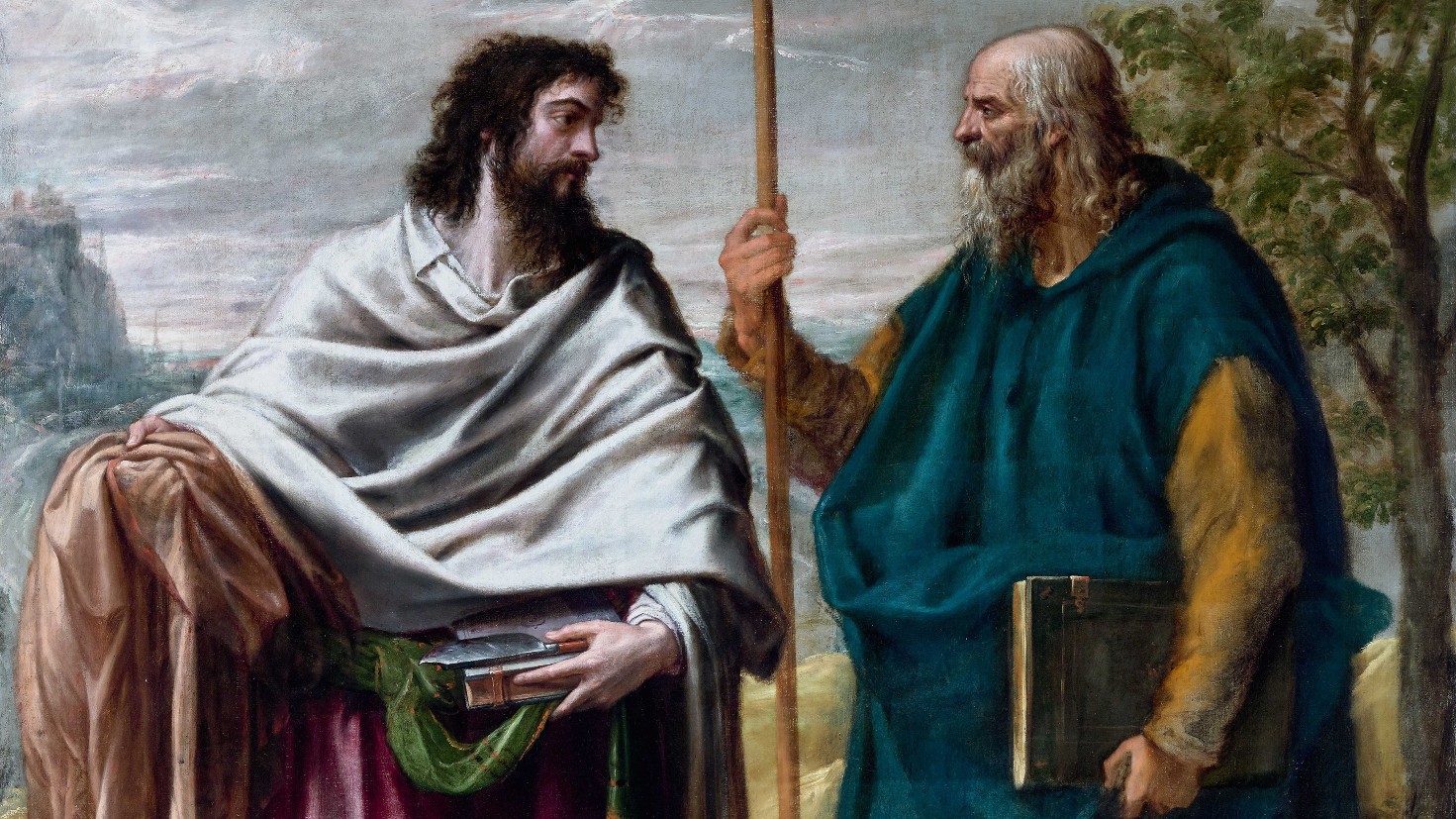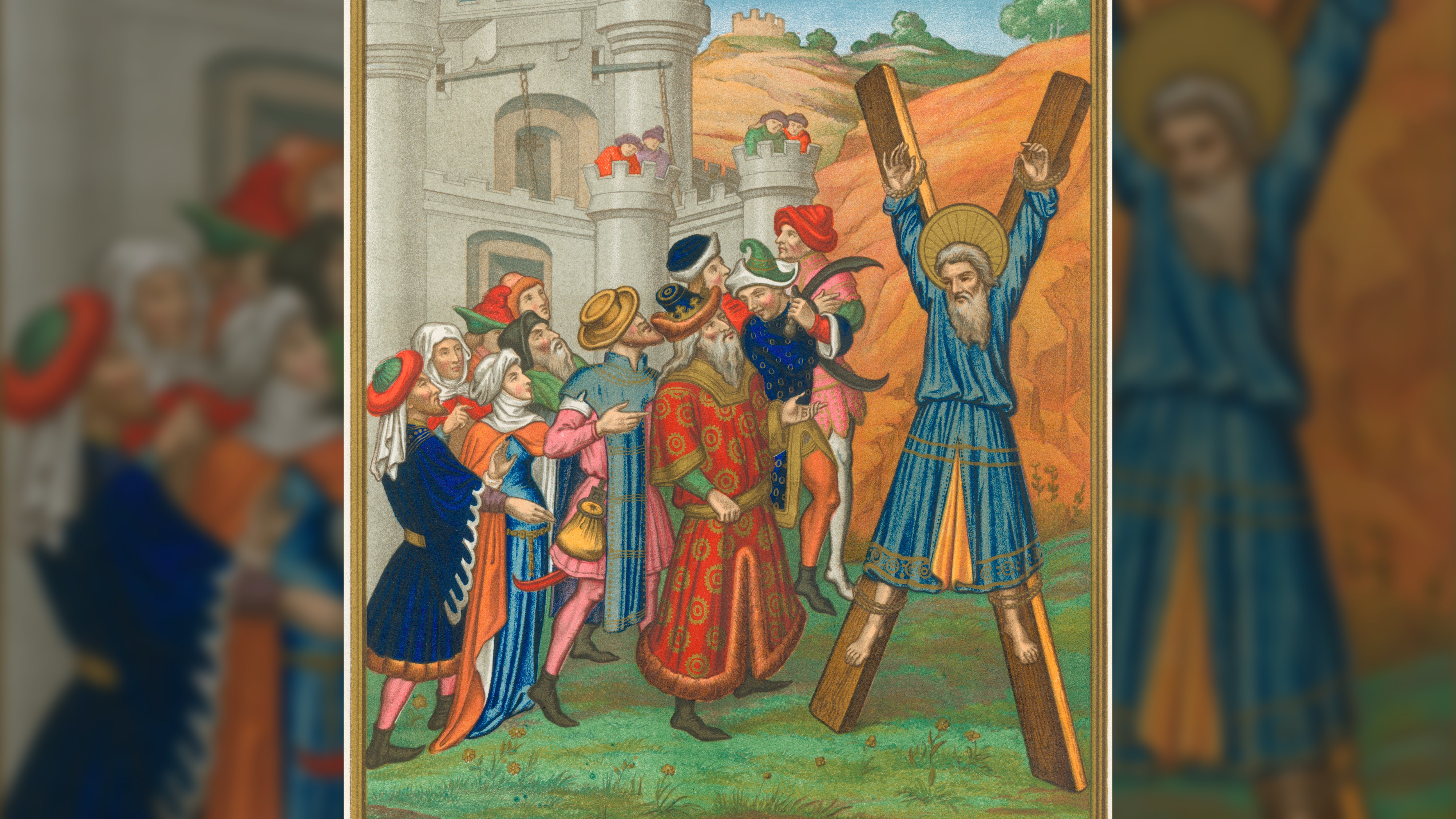The apostles: How Jesus' followers founded Christianity
The apostles followed Jesus and after his crucifixion went their separate ways, helping to found the early Christian church.

The apostles were 12 of the disciples of Jesus who went on to spread his message and found the early Christian church. After the crucifixion of Jesus in the 1st century, they split up and began to proselytize both the message of Jesus and the concept that he was the son of God. In so doing they expanded the following of this offshoot of Judaism and set out the early tenets of what Christianity would become.
The apostles typically refers to those who were among the original followers of Jesus, although the term apostle, which means "one sent on a mission," according to Merriam-Webster, is sometimes applied to later figures such as St. Paul who also had a big impact as a missionary. Their efforts helped to forge the religious movement that has shaped history and is today followed by around 2.6 billion people today.
Who were the apostles?
The Gospels of the New Testament and the Acts of the Apostles describe a core of twelve followers of Jesus that were closest to him. These are the men most commonly called apostles, though the term is occasionally applied to others in the Bible.
The Gospels give differing lists of the twelve apostles. All four agree that Simon, Peter, Andrew, James son of Zebedee, John, Philip, Thomas, and Judas Iscariot were among the disciples. The Gospel of John differs from the other three gospels however by either not mentioning several of the apostles or using different names. Most Christian sects have reconciled the differences between the lists by saying different names were used for the same person.
In the Gospel of Matthew it says that after a night of prayer "Jesus called his twelve disciples to him and gave them authority to drive out impure spirits and to heal every disease and sickness." These were activities that would require the physical presence of the apostles. In the Gospel of Mark, Jesus sends the apostles out in pairs, telling them to "take nothing for the journey except a mere walking stick — no bread, no [traveler’s] bag, no money in their belts — but to wear sandals; and [He told them] not to wear two tunics." The apostles were to lead a peripatetic existence both while with Jesus and after his death.
Related: 20 of the most bizarre stories from the bible
They were set on their various paths by Jesus himself, according to W. Brian Shelton, professor of theology and author of "Quest for the Historical Apostles: Tracing Their Lives and Legacies" (Baker Academic, 2019) who spoke to Live Science. In Matthew 28:19-20 Jesus commands the apostles to "make disciples of all nations." "The journeys of the apostles after the Book of Acts are significant because they represent the impetus of the apostles and a global expansion of the church," said Shelton
Though the death of the charismatic leader usually leads to the decline of a religious movement the apostles believed they had been given proof that he really was the son of God. "These disciples of Jesus had walked with the Messiah, witnessed his miracles and resurrection, gained inspiration from his teaching, and found transformation in their own lives," said Shelton.
They were given further proof when, during Pentecost, tongues of fire are said to have descended on them and they were given the power to speak all the languages. This would have proven useful in their later travels, though we are told some at the time were unimpressed with their new linguistic ability. According to Acts 2 NIV, they scoffed at the disciples and said "They have had too much wine."
While it should be approached with some skepticism historically, the Book of Acts is a fascinating document that reveals much about the lives of the early Christians. We are told that they met together for prayer, broke bread together, and lived together. Those who followed the apostles are said to have sold their property and laid their money at the feet of their leaders so that all things could be shared among them. However, the early Christians and the apostles would not be able to stay in Jerusalem forever.
Persecution of the apostles
Jesus had been put to death for causing trouble for both the Jewish and Roman authorities. A group of people hoping to further his message was unlikely to be looked on favorably. We are told of several apostles being arrested for their activities spreading the message of Jesus. The harassment of the early Christians did not stop at arrest.
The first of the apostles to die, other than Judas, was Stephen. Dragged before the Sanhedrin, the supreme council and tribunal of the Jewish people, he was sentenced to death and stoned. One of those watching this execution was Saul, a man who would later become St. Paul after his conversion on the road to Damascus. The Book of Acts describes how a great persecution then erupted.
The Book of Acts describes how king Herod had Peter arrested and put in jail. "Herod lived as a faithful Jew, so he would naturally have been concerned to stop the growth of any heretical sect," wrote Sean McDowell, author of "The Fate of the Apostles" (Routledge, 2018). Only the timely intervention of an angel freed him. Peter, according to the Book of Acts, "departed and went to another place," avoiding the martyrdom that was looking like a common end for the apostles.
While the followers of Jesus who left Jerusalem spread his message, the apostles who remained there had to decide exactly what that word was. Some felt that converts to Christianity first had to become Jewish. Paul seems to have not required this. The first controversy of the church that was settled by a council involved several of the apostles meeting in Jerusalem to decide if converted followers of Jesus had to be circumcised.
This matter was important because the apostles had begun to win converts in non-Jewish areas. The settling of the matter also reveals much about the structure of the early Church. The apostles voice their opinions in turn and a letter is sent to the Christians in Antioch who had first raised the matter. Letters and council decisions would long play a role in administering the church.
"The first council of apostles in Jerusalem have authoritarian pronouncements concerning the admittance of the Gentile converts into the Christian movement. Yet this did not seem to have the ecclesiastical authority then that we attach to it now," wrote William Steuart McBirnie, author of "The Search for the Twelve Apostles" (Tyndale Momentum, 2008).
Last to speak in this first council was James the Just, also known as the brother of Jesus. According to the historian Eusebius James was the first bishop to be appointed over the church in Jerusalem. That he is said to have remained in this position for thirty years shows how important the apostles’ direct connection to Jesus was to their authority.
The apostles' place in history

The Book of Acts was probably written after 90 A.D. and by the same author as the Gospel of Luke. The relatively early date of authorship makes it a valuable source as it is entirely possible that the author knew some of the apostles, or knew people who had known them. Other texts are more problematic as they were sometimes written centuries later.
"The historical accounts of the apostles after the New Testament are primarily contained in a genre of literature known as the Apostolic Acts. These works are marked by fantastical stories, speeches and theological teaching contrary to the New Testament, and a worldview known as gnosticism," said Shelton. There are other sources that can be used in piecing together their lives. "Their historical accounts are also contained in sermons, commentary writings, and histories by church fathers, often without historical substantiation and sometimes with minor elements of contradiction to other sources," added Shelton.
Related: When was Jesus born?
Some of the later Apostolic Acts contain extraordinary tales that may not be literally true but would have helped to spread the faith of Christianity by entertaining and educating at the same time. Shelton told Live Science about one tale "that often gives an audience a good laugh is the episode of Paul encountering a lion in the wilderness of Palestine in The Acts of Paul. The lion talks, inquires about the faith, becomes a disciple, and seems to have even been baptized by Paul. When the apostle is later thrown to the lions at Ephesus, a reunion takes place that day rather than a martyrdom."
Peter, always listed first among the apostles, seems to have been the first to found a church outside of Jerusalem. Tradition has it that he was the first Patriarch of the church in Antioch, today located in southern Turkey. He may also have created a Christian community at Corinth.
Yet it is Rome that is most associated with St. Peter. The Pope claims direct apostolic succession from Peter as the Bishop of Rome. The writings of Paul do not mention Peter in Rome even when discussing the church there, nor does the Book of Acts. Tradition however has long placed him there and many sites in the city are claimed to be linked to him.
The Apostle John was recorded as remaining mostly in Judaea and aiding in the conversion of people to Christianity. Later traditions give him adventures of his own. Tertullian, writing in the late 2nd century, says that John was persecuted and plunged into boiling oil. Luckily the Apostle emerged unscathed and was then exiled to the isle of Patmos off the Turkish coast. Tradition has John living a long life – perhaps until as late as 98 A.D.
While it was inside the Roman Empire that the Christian message found its first converts tales have long been told of the apostles traveling much further afield. One text in Acts describes how Matthew traveled to Ethiopia to spread the word of Jesus. Matthew eventually converted the royal family of Ethiopia. Though the sources for this mission are much later there is indeed an ancient Christian community that exists in Ethiopia, which can be traced back to at least the reign of Aksumite emperor Ezana in the 4th century, according to the Met Museum.
Other apocryphal gospels however place Matthew as performing his ministry elsewhere. "The Acts of Matthew accounts how two magicians conjured a dragon to charge the apostle, which he rebukes and turns against the magicians," said Shelton. Other, less fabulous, sources do however say that Matthew met his death in Parthia.
The Apostle Thomas is supposed to have journeyed furthest in his preaching. The Acts of Thomas, written in the 3rd century tells of how he was told by Jesus to go to India. When Thomas, not for the first time, expresses doubts "Jesus forces his hand by selling him to the merchant Abban," who was heading to India. In India the Apostle undergoes various adventures before serving a local king called Gondophares.
"The Thomas journey has strong historical support. Throughout church history, new missionaries to India often landed to discover an established church there which linked itself to the ministry of Thomas in the first century. That pride extends even to today, where Indian Christians carry the name, 'Thomas Christians'. A strong oral tradition, legends, hymns, poetry, and histories still circulated today perpetuate the tradition that Thomas came to India. Both the cities of Mylapore and Andrapolis have sites that lay claim to his martyrdom there" Shelton told us.
There is also a tradition that the Apostle Bartholomew visited India but most scholars reject this view. There is however a strong link between Bartholomew and Armenia. There he is said to have converted the local king to Christianity. It was also there that he met a particularly gruesome death – a fate that awaited many of the apostles.
How did the apostles die?

Images of Bartholomew can be found in churches across the world, though at first people can find them hard to interpret. Bartholomew is often shown carrying something that looks like a melting wax figurine. Closer examination reveals that he is actually holding his own flayed skin. Tradition has it that he was skinned alive and beheaded for his conversion of king Polymius.
Bartholomew’s fate was not so unusual if tradition is to be believed. Of the twelve apostles, including Matthias who replaced Judas, eleven are said to have died for their faith.
St. Peter was supposedly crucified upside down in Rome after declaring he was unfit to die in the same way as Jesus. Simon the Zealot is said by some texts to have been sawed in half in Persia. A 3rd century text says Andrew was scourged and crucified, surviving on the cross for three days. Hardly any of the records of the deaths of the apostles would pass historical scrutiny judging by modern standards of scholarship but the stories associated with the ends of their lives were massively influential for centuries in Christianity.
It is perhaps fitting for people who preached about life after death that many of the apostles enjoyed colorful afterlives. The bodies of the apostles became important relics and sites of pilgrimage.
In one legend Regulus, bishop of Patras in Greece, was visited by an angel in 345 A.D. and told to move the bones of St. Andrew as far as he could from their resting place. He packed them up and traveled with them all the way to Scotland, to the city now known as St. Andrews.
The bones of St. James that became the basis of the great pilgrimage route to Santiago de Compostela were discovered by a holy hermit called Pelagius in 814 A.D. Strange lights in the sky led him to the tomb of the Apostle. Quite how the Apostle came to be buried in Spain was not recorded.
It is likely that we will never know whether the relics that are claimed to be those of apostles are authentic. But in many ways it does not matter as the story of how they came to be revered and the centuries of devotion that have been paid to them is of interest in itself.
Additional resources
To learn more about the spread of Christianity and the way the religion broke up into different groups, you should read about why there are so many denominations.
To dig a little deeper into the real history behind the stories in the Bible, we have 20 of the most bizarre tales for you to read about.
Bibliography
- "Quest for the Historical Apostles: Tracing Their Lives and Legacies" by W. Brian Shelton (Baker Academic, 2019)
- “After Acts: Exploring the Lives and Legends of the Apostles” (Moody Publishers, 2015) by Bryan Litfin
- “These 12 Men Shaped Christianity – But Were They Real?” by Simon Worrall National Geographic
- “The Apocryphal Acts of the Apostles” by Various Authors
- "The Fate of the Apostles" by Sean McDowell (Routledge, 2018)
- "The Search for the Twelve Apostles" by William Steuart McBirnie (Tyndale Momentum, 2008)
- "What is the historical evidence that Jesus Christ lived and died?" The Guardian
- "'Did Jesus Exist?' A Historian Makes His Case" NPR
- BibleGateway
Sign up for the Live Science daily newsletter now
Get the world’s most fascinating discoveries delivered straight to your inbox.
Ben Gazur is a freelance writer and author. He has a PhD in Biochemistry from the University of Edinburgh but writes mainly about history. His book on the philosopher Epicurus is coming out soon. You can follow him on Twitter at @BenTheEpicure.











